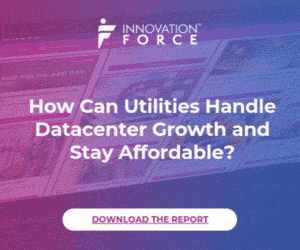About fifty or so years ago – when our modern power grid and the Baby Boomers that created it – were still in their formative stages, the late comic and crooner, Jimmy Durante, recorded a duet with Patty Andrews (one of the legendary Andrews Sisters) titled, “It’s Bigger Than Both of Us.” The song was a big hit in its time, but the title also frequently found its way into Jimmy’s stand up and sitcom routines whenever he was faced with a looming and formidable challenge.
I think we can probably all agree that the evolving future of the so-called “Smart Grid” qualifies as a looming and formidable challenge, right? Why then, as we are facing the task of completely redesigning and repurposing the grid, are there so many technical staff members at utilities that seem not only willing – but deeply determined – to go it alone.
Let me be frank… far too many utility folks I’ve come across are still willing to go to great lengths to keep suppliers at bay when instead, they should be welcoming suppliers whenever they come and actively inviting them if they don’t make first attempt. Engineers are supposed to be naturally inquisitive and always interested in learning new things. I wish someone would explain to me why any engineer would want to be isolated from the huge cache of information that is available from suppliers – especially when it’s all free for the asking!
Another one of Jimmy’s famous – and timeless – quips was this one: “Everybody wants to get into the act!” Considering the magnitude of the challenges that lie ahead for the electric utility industry, I’d say that would probably be a good thing in this case. Achieving even the most basic objectives of smart grid implementation will take a team effort, at the very least. There are so many things that have to be changed and in some cases reinvented, that I can’t imagine how anyone could think they already know everything they need to know or can find that knowledge without any outside help.
Yet time and again, I hear people saying that they don’t want to be bothered by suppliers calling and asking a bunch of questions or trying to find out how they can help by providing potential solutions to real needs. Exactly when did all of the knowledge about automation and IT solutions move exclusively into the domain of users? Of course I’m being sarcastic, but only to emphasize an all-too-real behavior that is anything but new.
Back when I was a salesman myself, selling SCADA systems to energy and utility companies, I was very fortunate to have worked with mostly open and friendly engineers and managers in the oil and gas pipeline industry. In fact, to this day many of us are still good friends, even though we cross paths far less frequently over the years. Thinking back to how some of those relationships were formed, I remember one particular sales trip to the West Coast that was a real eye-opener for me.
Toward the end of a long week on the road I was calling on an engineering company in Southern California that I had never approached before. The meeting was set up by our sales representative, who had previously worked with the guy I was meeting when they were both employed by a major oil company some years earlier. However, my rep had a conflict with another appointment and left me there to break the ice on my own. Meeting new people has never bothered me, but experience had taught me that engineering consultants are usually a tough sell, especially on the first round.
After a brief wait in the reception area I was invited into his office, and we exchanged the usual greetings and pleasantries. But I noticed right away that something very different was going on than what I had anticipated. Rather than the usual stiff Q&A routine I was accustomed to – rapid bursts of questions about my company, market experience, other customers and so forth – he began the dialog by asking questions about me. Had I been to California before? Where did I get my experience? What kinds of things did I like to do in my free time? This was very peculiar, indeed.
After talking for another fifteen minutes over a second cup of coffee, he finally got around to asking about our products and services. We had a very friendly and downright enjoyable conversation about how our offerings could be applied in the projects he had on his radar at the time, and eventually the conversation came back around to how we might best go forward. By this time I was dying to ask him the obvious question: Why are you being so nice to me? Frankly, I was wondering if perhaps he didn’t realize that I was a salesman! When I finally put the question to him, he suddenly became very serious as he launched into what proved to be a most interesting answer.
He started out by telling me that during his years at the oil company – where he had started as a young engineer right out of college – he was taught by his superiors that all sales people (or “peddlers” as his bosses and co-workers called them) cared about was making a sale. He was also shown how to low-ball estimates and encouraged to squeeze every last dime out of every sale as much and as often as possible and to take advantage of whatever the peddlers offered – free lunches, golf outings, etc. – without guilt or remorse. They said he shouldn’t feel badly about it because after all, that’s all peddlers were really good for anyway.
As we talked, he revealed that it wasn’t until he changed jobs and went to work for a supplier company that he finally gained some perspective. He quickly came to realize that not only are ‘peddlers’ people deserving of respect just like anyone else trying to do a job, but that they actually served a useful purpose. He went on to say that he was actually quite surprised when he realized that his colleagues on the suppliers’ sales team were all much like him, raising families and just trying to earn a living. Looking back on his oil company experience, that possibility had never really occurred to him.
He soon began to feel ashamed of how he had treated people that were just like him. So, he made a promise to himself that he would behave very differently if he ever got another chance. As it turned out, that chance was our meeting – his first since leaving the supplier company and entering the consulting world. The man’s name was Shawki Jurjis, a Lebanese engineer that taught me an invaluable lesson that I will not ever forget about the importance of treating others in the way you would like to be treated, should the tables ever be turned.
Shawki and I never actually had a chance to work on any projects together, but we became good friends nonetheless and helped each other out whenever we could. His background and mine could not have been any more different, yet we got along personally and professionally as if we had everything in common. (I haven’t seen Shawki in many, many years, but if you happen to run across him, please tell him I said thanks for the invaluable lesson in interpersonal relationships!)
So, the next time you get a call from a supplier or find a salesperson waiting at your door, remember that they aren’t the enemy. You don’t have to put up a shield to protect yourself from inadvertently buying something, and you certainly don’t need to be rude or react in a negative way. Most sales people today are highly trained, experienced professionals that have a broad purview of what’s out there and how it can be applied in beneficial ways. Instead, consider the possibility that this person just might have the answers you need or, perhaps help you find them.
To run and hide or refuse vendor calls and meetings altogether is to risk depriving yourself of a valuable resource that is desperately needed in these changing and challenging times. And, as we attempt to completely redesign and redevelop the grid in the weeks, months and years ahead, graciously accept all the help you can get because, believe me… “It’s bigger than both of us!”
Behind the Byline
Mike Marullo has been actively involved in the automation, controls and instrumentation field for more than 35 years and is a widely published author of numerous technical articles, industry directories and market research reports. An independent consultant since 1984, he is President and Director of Research & Consulting for InfoNetrix LLC, a New Orleans-based market intelligence firm focused on Utility Automation and IT markets. Inquiries or comments about this column may be directed to Mike at
MAM@InfoNetrix.com.
©2008 Jaguar Media, Inc. & InfoNetrix LLC., All rights reserved.
December 7, 2025







